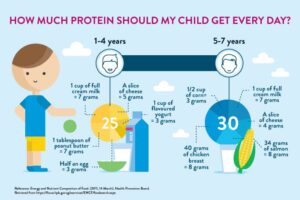Protein is an essential nutrient for brain development in children. The brain requires a variety of nutrients to function properly, including protein, which is necessary for building and repairing tissues, as well as for producing important neurotransmitters.
Protein-rich foods such as lean meat, fish, eggs, dairy products, legumes, and nuts can provide the necessary amino acids for the brain to develop and function properly. In particular, certain amino acids, such as tryptophan, tyrosine, and phenylalanine, are essential for the production of neurotransmitters that regulate mood, behavior, and cognitive function.
It is important to ensure that children consume adequate amounts of protein in their diets to support optimal brain development. The amount of protein a child needs can vary depending on factors such as age, weight, and activity level. However, in general, children between the ages of 4 and 13 need about 0.5 grams of protein per pound of body weight per day.
In addition to protein, a healthy and balanced diet rich in fruits, vegetables, whole grains, and healthy fats can also support brain development in children. Regular exercise, adequate sleep, and limited screen time can also play a crucial role in promoting healthy brain development and overall well-being in children.




